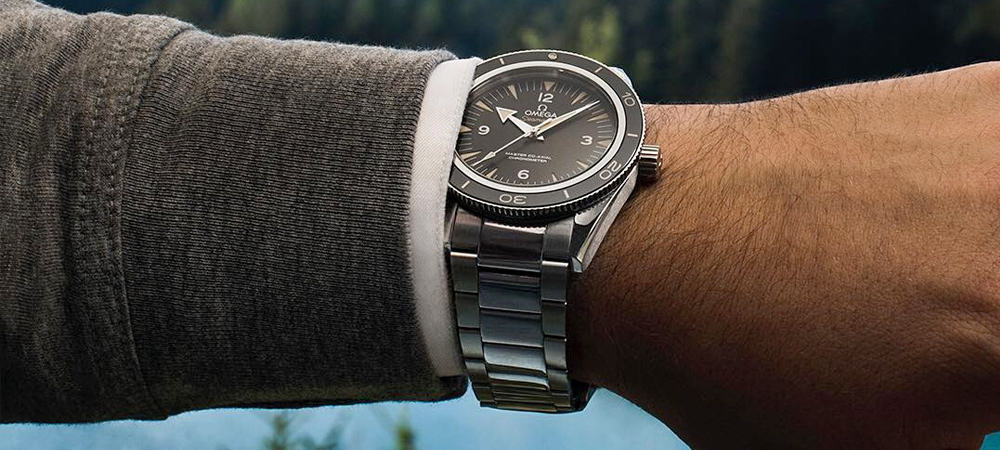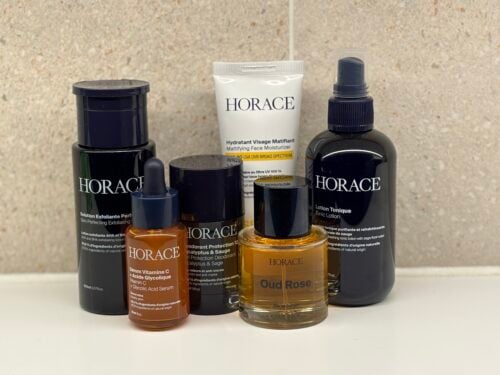Horace Skincare Review: Why Horace Is Dominating The Modern Man’s Bathroom Cabinet
Feb 21, 2026Why Every Stylish Wrist Deserves A Swiss Watch
- Feb 10, 2024
- 0 Comments
402

You’ve noticed the cheesy Patek Philippe ads, gazed at your boss’ Rolex during meetings, maybe even threatened to get your grandfather’s pocket watch repaired one day… and now you’ve saved a bit of cash, it’s time to bite the bullet and invest in your very own Swiss watch.
That last particular word is probably one of many reasons why it’s taken this long – do you really want to be the sort of man who calls his watch a ‘timepiece’? Or, even worse, a ‘chronometer’? It’s true, the watch world can be a rather snobby, anorak-clad institution, whose idiosyncrasies you might forgive if it wasn’t for the astronomical cost of joining this particular club. Even supercars manage to retain an everyman appeal (although, to be fair, there aren’t many teenagers’ bedroom walls pinned with Breitling posters).
The good news, if you’re seriously thinking about doing it, is that a decent Swiss watch is generally worth its price tag – crafted just as exactingly as a Ferrari, by artisans whose skills are generally limited to the valleys of the Swiss Jura mountains. But still, why wear one at all, when the precise time is displayed everywhere in our ‘always on’ digital age?
“It’s no wonder more and more women are buying engagement watches for their new fiancés, in return for their ring.”
Madhvani’s notion of eternity isn’t so far-fetched. Just a little TLC will mean your mechanical wristwatch can tick forever – its timeworn technology is totally safe from obsolescence, unlike that shiny new smartwatch.
“With brands like Patek Philippe and Rolex,” he continues, “ your watch could potentially accrue in value , even. In terms of mechanical objects, only a fully restored vintage Ferrari is capable of that. In terms of cost per wear, there’s simply no comparison – unless you can honestly name an item of clothing or pair of shoes that you’ve worn every day for years, which still looks and functions just as well?”
Greg E. Mathieson Sr./REX/Shutterstock
Madhvani’s notion of eternity isn’t so far-fetched. Just a little TLC will mean your mechanical wristwatch can tick forever – its timeworn technology is totally safe from obsolescence, unlike that shiny new smartwatch.
“With brands like Patek Philippe and Rolex,” he continues, “your watch could potentially accrue in value, even. In terms of mechanical objects, only a fully restored vintage Ferrari is capable of that. In terms of cost per wear, there’s simply no comparison – unless you can honestly name an item of clothing or pair of shoes that you’ve worn every day for years, which still looks and functions just as well?”
So Why Buy A Swiss Watch?
A mechanical movement is a beguiling thing to behold as well as listen to, ticking away at 28,800 vibrations per hour. Its hundred-odd tiny parts are all machined laboriously and precisely from steel or brass, polished to varying degrees of shimmer and shine, then hand-assembled by one of the world’s most skilled workforces in light-drenched mountaintop ateliers. A joyous anachronism in this digital world, with prices that can stretch to the equivalent of a three-bed Croydon semi (try Googling ‘Greubel Forsey’).
But while the underlying mechanical principles of mainsprings, gear-trains and ticking balance-wheel escapements were more-or-less shared around the world (and still are), the Swiss managed to mark themselves out from London, New York or Paris’s artisans. How? Division of labour.
It was down to the genius of goldsmith Daniel Jeanrichard (1665-1741), who devised a system called établissage in the Jura mountains. This cottage industry (chalet industry?) saw the closely guarded knowledge of a few watchmakers spread to independent workshops, each one with its own specialism. The system survives to this day.
In fact, many of the workshops dotting the valleys of the Jura were run by the local dairy farmers who, come the harsh, isolating winter snow, would round up their livestock and turn to their home workshops. Making wheels of cheese with cows turned into making wheels of metal with lathes.
REX/Shutterstock
“From the 1740s to the early 1800s,” explains Michel Golay, who runs Audemars Piguet’s watchmaking museum in Le Brassus, “the farmers-turned-watchmakers in the Jura walked to Geneva every spring to sell the movements they’d made over the winter to the cabinottiers and établisseurs, who finished the movements and cased them up as complete, branded watches.”
Soon enough, the hill farmers realised they could make more money by putting their own names on the dials, says Golay. “Many of them stopped farming altogether and began making watches all year. Families throughout the valley co-operated, and gradually the quality of the craftsmanship increased, as did their reputation.”
The Jura’s La Chaux-de-Fonds is considered the true ‘cradle’ of Swiss Jura watchmaking – the highest city in Europe at 1,000 metres above sea level, colloquially known as ‘Watch Valley’. Here, in this snowy backwater of central Europe, you’ll find the gleaming glass and steel factories of Tissot, TAG Heuer, Breitling, Cartier and countless others nestled idyllically in rolling, verdant foothills, surrounded by cows and their clanking bells.
REX/Shutterstock
How Much to Spend on a Swiss Watch?
So how much to spend, and what will that get you?
Like with holidays or property, that age-old adage applies with a wristwatch: spend as much as you can afford, as you’ll never regret it. But whatever that figure is, rest assured that with Swiss watches, you will invariably get your money’s worth.
Under £500
Watch snobs be gone: less than £500 will get you a very decent piece of wristwear, with all the after-sales support you’d expect from a watch 10 times the price. You’ll struggle to find a Swiss mechanical movement much under £800 (with the noble exceptions of Tissot and Hamilton) but there’s no shame in a Swiss quartz watch, powered by a battery instead of a spring.
It uses the 32kHz vibration of the titular crystal to regulate the ‘tick’ of the watch – infinitely more precise than a mechanical balance wheel oscillating at a relatively agricultural 4Hz, and losing no more than 10 seconds a year.
For the most affordable watches look to Swiss-made Bulova, Certina, Tissot and Mondaine (but also note that Japanese watchmakers Seiko or Citizen are arguably the heavyweights when it comes to quartz).
Swiss Watch Brands Under £500
For the most affordable watches look to these Swiss-made brands:
- Bulova
- Certina
- Tissot
- Mondaine (but also note that Japanese watchmakers Seiko or Citizen are arguably the heavyweights when it comes to quartz).
£500–£3,000
This is the budget bracket you should be considering with your first company bonus – you’ll be guaranteed the prestige of a Swiss mechanical, preferably ticking away beneath a clear caseback, admirable in the same way as a mid-mounted Ferrari V8 growling beneath its glass engine cover.
An automatic mechanical movement is the most common, and this is where your money’s going. Fitted with an off-kilter weight, or ‘rotor’ that swings with the movement of your arm, this keeps the winding barrel tightly wound. In turn, the winding spring powers a gear-train to which hours, minutes and seconds hands are attached. Manually-wound mechanical movements are increasingly popular, though, as the lack of rotor permits a clearer view into that mesmerising constellation of moving parts.
Brands to bear in mind include Longines, Bell & Ross, Victorinox, Raymond Weil, Nomos Glashütte and Tudor.
Swiss Watch Brands Under £3,000
- Longines
- Bell & Ross
- Victorinox
- Raymond Weil
- Nomos Glashütte
- Tudor
Up To £5,000
This is where it can get overwhelming, as many make their first big horological investment in this price range and don’t want to get it wrong. So, for a start, do your research, take your time, visit your friendly local jeweller and don’t be afraid to ask stupid questions – chances are, they’re wiser than you think.
Swiss Watch Brands Up To £5,000
The good news is that so many of Swiss watchmaking’s enduring classics fall into this category, and you’ll never go wrong purchasing one, whether it’s a TAG Heuer Carrera, Omega Seamaster, Tudor Black Bay, or even a Breitling.
- TAG Heuer
- Carrera
- Omega Seamaster
- Tudor Black Bay
- Breitling
North Of £5,000
This is venturing into serious collector territory, where most of your cash is going towards a movement that – rather than being a standard-issue Swiss automatic mechanical movement – gets ‘manufacture’ mechanics, and is made ‘in-house’ by the brands, with exacting hand-polish applied to the tiniest parts as icing on the cake.
Swiss Watch Brands Over £5,000
- Rolex
- Zenith
- IWC
- Hublot
- Jaeger-LeCoultre
Decisions, Decisions…
To kick off, you’ll want a watch for every eventuality – or at least one that straddles a few of life’s regular scenarios. An easy choice for the office is a black leather strap and a clean, silver dial. But when Saturday comes, you may also want a watch that looks appropriate while trimming the hedge – in which case, a metal bracelet instead of leather makes it perfect for both.
Obviously, ‘one watch to rule them all’ will only stretch so far – which is where the notion of a watch wardrobe comes in. It takes years of steady, considered investment, but a solid line-up for the top of your dresser (or sock drawer) looks something like this:
What Are the Different Types of Watches?
To kick off, you’ll want a watch for every eventuality – or at least one that straddles a few of life’s regular scenarios. An easy choice for the office is a black leather strap and a clean, silver dial. But when Saturday comes, you may also want a watch that looks appropriate while trimming the hedge – in which case, a metal bracelet instead of leather makes it perfect for both.
Obviously, ‘one watch to rule them all’ will only stretch so far – which is where the notion of a watch wardrobe comes in. It takes years of steady, considered investment, but a solid line-up for the top of your dresser (or sock drawer) looks something like this:
The Rugged All-Rounder
Slightly retro military-style watches work well here, with black dial, monochrome markings and maybe a brown-leather strap, e.g. Bremont’s Airco or Tudor’s Heritage Ranger.
Tudor Heritage Ranger
The Diving Watch
Water-resistance and ruggedness are key here, making diving watches great for strapping on and forgetting about – ideal for beach holidays, epic post-dinner-party washing-up sessions, or simply making a colourful statement, e.g. Victorinox INOX Diver.
Victorinox INOX Diver
The Dress Watch
What it says on the tin: classical formality for the boardroom meeting or black tie event, e.g. Longines Flagship or Cartier Tank.
Cartier Tank
Sports Watch
This usually means a stop-watch chronograph is in the mix, with either a rubber strap or metal bracelet, e.g. Baume & Mercier Clifton Club.
Baume & Mercier Clifton Club
The Classics
A rare breed of watch from one of Switzerland’s big boys that’ll never age or look out of place. Usually comes on a bracelet. Look no further than Omega’s Seamaster, Rolex’s Submariner (both diving watches, funnily enough), the IWC Portugieser and TAG Heuer’s Carrera.
Omega Seamaster
The Brands
Buy a watch from any reputable dealer or direct from any of the big brands, and you can’t go wrong – neither have come this far flogging dodgy tickers hung from the inside of their overcoats. But what sort of design, heritage or make-up speaks to you, and what does it say about you? There’s no getting around it; the brand you endorse is important, especially as it’s just about the most personal thing you’ll possess. Just make sure of one thing: go into the store and try it on. You’ll instantly know, either way.
1. Tissot
One of the grand dames of Swiss watchmaking, with heritage in spades, and along with Rolex and Omega, a member of the rarefied ‘billion club’ [its revenue was $1.1m last year]. Despite what you’d think, however, Tissot is one of the most affordable means of joining the rarefied Swiss-made-watch club – £395 will get you a supremely chic Le Locle automatic, named after Tissot’s home town.
2. Baume & Mercier
A member of Richemont Group’s unrivalled portfolio of luxury watch brands (stablemates include Cartier, IWC and ‘the German Patek Philippe’, A. Lange & Söhne) most people quietly respected 188-year-old B&M as the necessarily affordable arm of a formidable arsenal of haute horlogerie.
But just when you thought it was all inoffensive ‘sports luxe’ kitted out with third-party mechanics, the Baumatic comes along – genuinely ‘in-house’ innovation with antimagnetic silicon components, five-day power reserve and five-year service intervals… all for just £2,500.
3. Oris
Most recently, as well as a handsome four-grand venture into prestige ‘manufacture’ movements, the focus has been beneath the waves, spearheaded by a number of noble ocean-conservation initiatives and arguably the finest retro revivals in a recent swathe of retro revivals – the Divers Sixty-Five.
4. Longines
A rung or two up the vast Swatch Group’s portfolio from Tissot, you’ll find Longines – a brand that rivalled Omega and Rolex back in the day, with a string of important technical evolutions in the early 20th century, including chronographs for the wrist, sports timing equipment and lifesaving navigational aids for those magnificent men in their flying machines (including one Charles Lindbergh, no less).
These days, the innovation is left to other Swatch Group brands like Breguet and Omega, but for good-value, classically designed Swissness, you can’t beat Longines’ Master and Heritage collections.
5. Tudor
From its 1940s conception, Tudor mirrored Rolex – it had the same designs and model names, but with a different logo and cheaper movements. Genius marketing initiative from Switzerland’s biggest name. However, Tudor’s ‘Submariner’ diving watch was quickly adopted by the Israeli naval commandos in the 1960s, followed famously by French naval divers and the US elite combat divers. And it’s this heritage that’s been drawn on so effectively in recent years, affording ‘Rolex’s little brother’ to grow up at last into a titan of Swiss watches, complete with in-house movement factory. Still just as affordable, mind.
6. Omega
7. Rolex
Hans Wilsdorf founded the Most-Namechecked Brand in Hip Hop as recently as 1905, in London believe it or not, giving it a generic name that was easy to pronounce across different languages. He was a marketing genius, strapping his newfangled ‘Oyster’ to English Channel swimmer Mercedes Gleitze in 1926 and advertising its proven water-resistance on the front cover of the Daily Mail. The Oyster developed into the Submariner diving watch in the fifties, in response to the burgeoning craze for SCUBA, and was worn by James Bond well into the Timothy Dalton days.
8. Zenith
An early pioneer of the ‘manufacture’ process, Zenith brought virtually every trade in watchmaking beneath a single roof in Le Locle (over the road from Tissot) in order to speed up development and guarantee parts supply.
Its other claim to fame is the El Primero chronograph, which tied with Heuer’s Calibre 11 in 1969 as the world’s first self-winding stopwatch for the wrist, but still has the edge thanks to its high frequency tick. This essentially means it can time events to a margin of one tenth of a second rather than an eighth. ‘Basic’ El Primeros also happen to be the most bargainous in-house automatic chronographs out there.
9. Officine Panerai
Every corner office’s favourite timekeeper started life in the thirties, when the Italian Navy requested a diving watch from its preferred equipment maker. More used to making saltwater chandlery than finickity tickers, Panerai turned to Rolex, who essentially added a strap to one of its cushion-shaped pocket watches. The iconic cushion shape stuck, but the rebooted brand now makes its own, top-end movements. Expensive, yes, but not nearly as expensive as those original Rolex models at auction. (If you can find one…)
10. Nomos Glashütte
To finish with a wild card, this is the only brand in our list that isn’t Swiss. Germany is your first port of call if you decide not to buy Swiss and Nomos is one of the country’s most impressive watchmakers. It’s also the only brand here formed in our lifetime, in 1990 – immediately after the fall of the Berlin Wall.
Publisher: Source link







